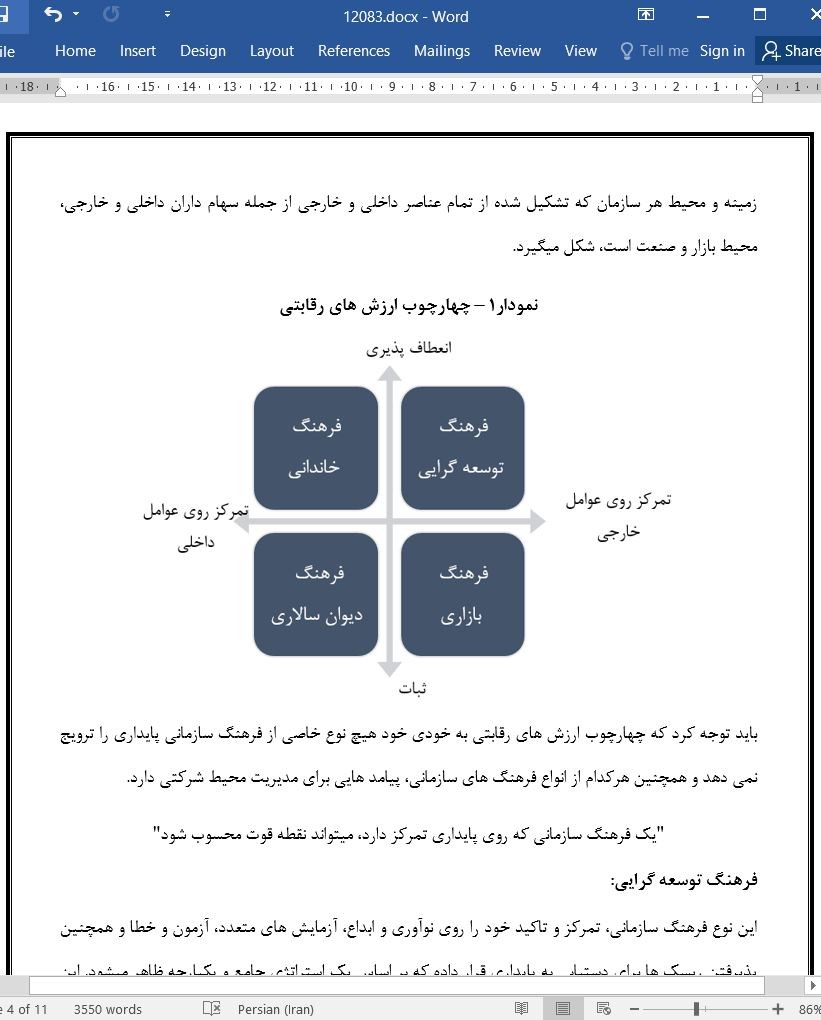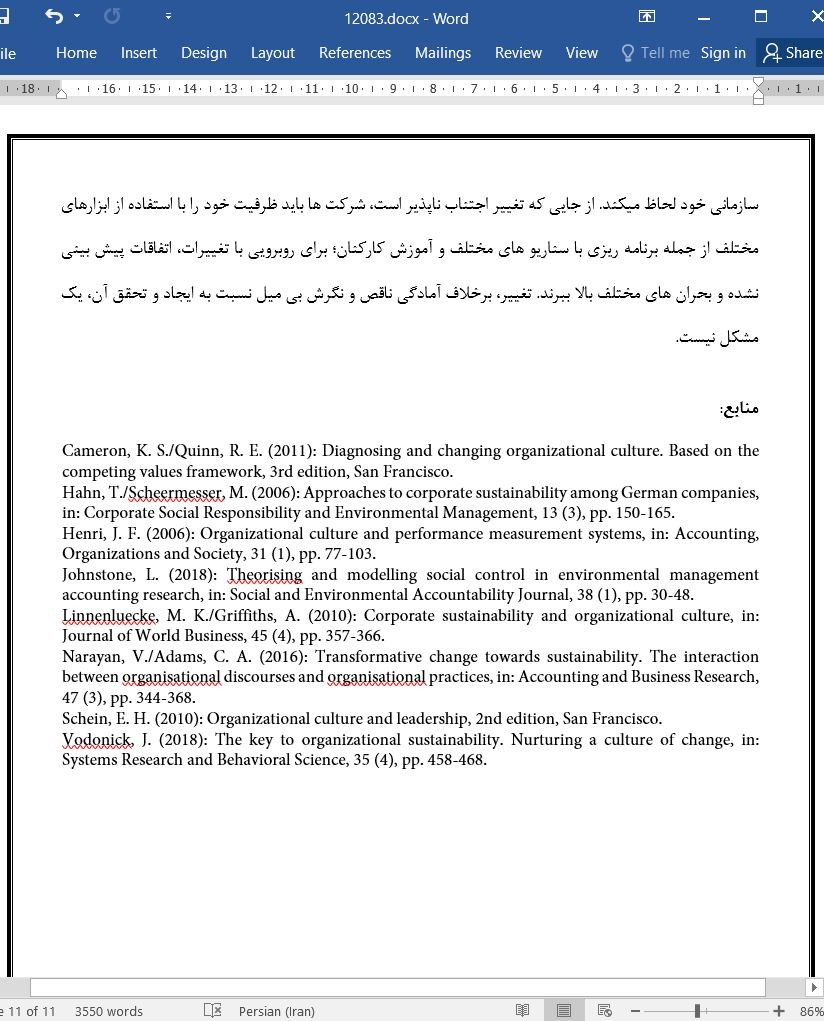
تغييرات فرهنگ سازمانی در راستای رسيدن به پايداری
در مديريت کسب و کار، يک عامل کليدي وجود دارد که عموما اهميت آن فراموش شده و توجهي به آن نميشود: فرهنگ سازماني؛ که تاثير مستقيمي نيز روي رفتار مديران و کارکنان، عملکردشان و نحوۀ پاسخگويي آنها در برابر چالش هاي داخلي و خارجي پيش آمده براي شرکت ميگذارد. همچنين فرهنگ سازماني نقش به سزايي در نگرش آنان درمورد تغيير داراست، با توجه به اينکه براي يافتن و تنظيم يک مدل کسب و کاري پايدار، ايجاد تغييرات تعيين کننده اي در شرکت لازم است.
فرهنگ سازماني نقش بسيار مهمي در موفقيت مديريت محيطي شرکت و همچنين دستيابي به پايداري شرکت ايفا ميکند. اجراي شيوه ها و دستورالعمل هاي محيطي بايد در فرهنگ سازماني گنجانده شود (جان استون 2018) تا آگاهي لازم را ايجاد کرده و در عين حال، سبب مباحثه ها و ارتباط هاي مربوط به مشکلات آن باشد. همچنين، فرهنگ سازماني يک ابزار تعريف و تعيين دستورالعمل ها و يک مکانيزم بازدارنده نيز هست که احتمال موفقيت بلندمدت مديريت محيطي شرکت را افزايش ميدهد. فرهنگ سازماني، روي رفتار و تصميم هاي مديران، سمت گيري استراتژي شرکت، عملکرد، روش هاي اجرايي و طرزفکر کارکنان درمورد تغيير و نوآوري تاثير به سزايي دارد.
نتیجه گیری
تبدیل جهان بینیِ ایستا به پویا و به کارگیری تغییر به عنوان یک فرآیند دائمی در تجارت و جوامع برای ادارۀ مشکلات محیط زیستی مانند گرمایش جهانی، یک نیاز ضروری و فوری میباشد. سازمان ها باید تغییر را بعنوان یک فرصت و نه یک تهدید بشناسند و با آمادگی بالا از پذیرش آن استقبال کنند. همچنین این تغییرات باید در فرهنگ سازمانی و استراتژی کسب و کار به کارگرفته شده و اجرایی شوند. تنها فرهنگی که میتواند ثبات و پایداری را بهبود بخشیده و ارتقا دهد، فرهنگی میباشد که از تغییر استقبال کرده، آن را میپذیرد و همچنین تغییر را در ارزش ها و باور های سازمانی خود لحاظ میکند. از جایی که تغییر اجتناب ناپذیر است، شرکت ها باید ظرفیت خود را با استفاده از ابزارهای مختلف از جمله برنامه ریزی با سناریو های مختلف و آموزش کارکنان؛ برای روبرویی با تغییرات، اتفاقات پیش بینی نشده و بحران های مختلف بالا ببرند. تغییر، برخلاف آمادگی ناقص و نگرش بی میل نسبت به ایجاد و تحقق آن، یک مشکل نیست.
In business management, one key factor is quite often overlooked: organizational culture. It influences the behavior of managers and employees, how they perceive and address the firm’s internal and external challenges, and attitudes towards change. To establish a truly sustainable business model, decisive corporate change is needed.
Organizational culture is of utmost importance for the success of corporate environmental management initiatives and the achievement of corporate sustainability. The implementation of environmental practices and guidelines must be embedded into the values and beliefs of the organizational culture (Johnstone 2018) to enable the required awareness as well as ongoing dialogue and communication about environmental issues. Moreover, organizational culture is also a disciplining instrument and control mechanism which may foster the likelihood of long-term success of corporate environmental management initiatives. It affects the behavior and decision making of managers and thus the firm’s strategic orientation, performance, procedures, and attitudes towards change and innovation.
Conclusion
There is an urgent need for the transformation from a static to a dynamic world view with change as a permanent process in business and society to address the challenges of global climate change and environmental degradation. Organizations must view change as an opportunity rather than a threat. An openness and high readiness for change has to be embedded into the organizational culture and the business strategy. Only an organizational culture that welcomes, embraces, and facilitates change and includes it in its organizational values and beliefs can promote sustainability. Since change itself is unavoidable, firms have to build capabilities to deal with change, unexpected events, and crises, for example by using tools such as scenario planning and employee training. Change is not the problem; insufficient preparation and a reluctant attitude are.
فرهنگ سازماني چيست؟
تاثیر نوع فرهنگ روی مدیریت محیطی مرکز
فرهنگ توسعه گرایی
فرهنگ دیوان سالاری
فرهنگ های خاندانی
فرهنگ بازاری
فرهنگ سازمانی، فضای شرکت و ابتکارات مدیریتی
مفاهیم مدیریتی
تغییر یک فرصت است
نتیجه گیری
منابع
What is organizational culture?
The influence of the culture type on corporate environmental management
Adhocracy cultures
Bureaucracy cultures
Clan cultures
Market cultures
Organizational culture and corporate environmental management initiatives
Managerial implications
Change is an opportunity
Conclusion
References
- اصل مقاله انگلیسی با فرمت ورد (word) با قابلیت ویرایش
- ترجمه فارسی مقاله با فرمت ورد (word) با قابلیت ویرایش، بدون آرم سایت ای ترجمه
- ترجمه فارسی مقاله با فرمت pdf، بدون آرم سایت ای ترجمه



